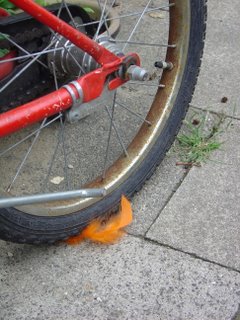In the ongoing discussion on the welfare state, running as a sport for the masses is more relevant than what you might possible think. After all, the whole point of the welfare state is that your country takes care of your health, no? I wonder then how comes that our doctors and biologists have allowed those masses to believe that pounding your knees with your full weight, for several hundreds times at a stretch and several times a week, could possibly be good for you.
The whole issue gets worse when prominent politicians in this little and flat country in which I live seems to be involved in a full conspiracy to get the masses to run. Pay attention to the recently launched book from Paul Rosemoller, former Groenlinks leader, in which we will read a (likely) very nicely written account on the political advantages of belonging... to the networks of marathon runners. Paul illuminates this face of contemporaneous politics, recounting anecdotes of all these nice and influent people, running and talking and making decision on our sake. And again I wonder... how can you possible think or networking when you are sweating, wasting calories on no end and going across nice landscapes at best, or along the polluted and crowded streets of your neighbourhood at worst?
I actually spend some years of my life thinking that running was good for me. With friends of my climber's club we used to train couple of times a week, circling again and again the campus of our university. The moment of passing by the cafes of our campus had the allure of a manly show of fitness. We run a bit faster, and taking care of our style, even if for those few instants. Some of us were fully convinced that this was the best way to pick up all these girls sipping their colas (not light) and espressos. Alas, the success of the mating strategy, looking backwards, was not very relevant. Probably all those girls were actually being picked by our fellows sitting at their side (sipping their own colas and espressos) and making fun of the sweaty idiots that pass now and then. Nor was the running itself particularly good for ourselves. I used to secretly think that I might loose my belly, which never happened (as that guy walking across the whole USA just discovered). Instead, I got chronic knee complains, and today I can not run more than fifty meters without feeling two sharp knifes exploring both of my meniscus.
Funnily enough, the CBS launched few weeks ago data showing that dutch people is indeed getting thinner, for first time in decades. The statisticians acknowledge the role that the public campaign for more exercise plays here. People do more sport than ever, and accordingly, they are leaner. Right away I imagine all these people comfortably nested in their couches, looking at the news and hearing the speaker of the CBS (my wife, actually) saying that more sport is good for you. Would they run to a gym? Would they simply run, to somewhere back and forth? I felt like paying an add after the press release and shouting in the tellie: don't run, it's bad for you! Stay in your couch and at most, stop eating chips! But probably the runners of this world would not be looking and again, it is hard to imagine that a couch potato would really get out running under the influence of some nicely presented statistical trends.
Walking back to the welfare state, then. Today most (dutch) political parties discover the problem that it is. I am tempted to say that it is a bit delayed discovery anyway. The discussion in academy is around twenty years old, and in Europe is since around five years a political hot potato. Scarcely two years ago dutch people looked at me condescendingly and explained that here in NL there was no problem whatsoever. I should have insisted and make my fame as political trendsetter, but instead, I believe them. Now it looks otherwise, and from Groenlinks to the PvdA, passing by the CDA, everybody has something to say and to propose about this big problem that the welfare state has become (overnight). Perhaps we get some improvements, actually. But I remain a bit suspicious of the way ideas get to be discussed in NL. Running was a big fad in the rest of the world some decades ago. Books like Rosemuller's were printed by the cartload in the seventies. Now the world seems to have become meniscus-aware, and people have discovered bikes. Friends that never dreamed of trusting their life to a two-wheeled contraption mail me frequently about their last item bought, perhaps a super light carbon based pair of biking shoes. Of course a proper dutch would explain me, condescendingly again, that bikes here have a long tradition, and there is nothing to say about it. But I keep on thinking that as much as the welfare state went into the limelight overnight, when all these meniscus shall begin to hurt (and actually become a national health matter), dutchies will rediscover their most popular transportation mean, and consider to use it as a sport.
Does anybody of you know how to buy shares of a dutch bike maker?

